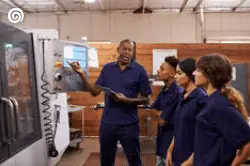Exploring Various Approaches to Acquiring CNC Programming & Machining Skills.
Discover why you might want to pursue a career as a CNC Programmer or CNC Machinist:
- CNC Programmers and CNC machinists are always in demand due to the technological improvements in our world.
- Our modern society is centered on the production of modern parts using robots and CNC machines.
- Professional CNC Machinists and CNC programmers get paid well.
- It is a career that you will never stop learning, it always evolves and brings more fun and excitement to your daily work life.
- Highly computerized CNC machines CAD and CAM systems eliminate the danger of physical activities.
[email_subscription]
Five Effective Strategies for Gaining Proficiency in CNC Programming and CNC Machining:
Learning Way 1: Apprenticeship Programs
To be honest, this is the most convenient approach to learning about CNC machining and associated vocations. Launch your CNC career with hands-on experience. Imagine having enough time, less responsibility, less stuff in your head, and maximum energy between the ages of 15 and 24.
All these positives bring the best learning experience for CNC apprentices. I remember how I was happy and fulfilled by learning new things about CNC and conventional machining every day.
Large-scale research shows most (almost %90) apprentices are happy with their way.
When you are an apprentice you start with absolute CNC beginner content which gives you a very strong foundation. Missions like cleaning machines and tools also lead to deep investigation opportunities for apprentices. Successful apprentices are generally gifted by the company with CAD-CAM courses.
CNC workshops and mechanical part manufacturers have very expensive CAD-CAM system licenses. These companies prefer teaching that software to apprentices so they can get more value for their investment in software and apprentices. This brings a huge opportunity for CNC apprentices to learn CAD-CAM systems.
According to this study, apprentices outperform graduates.

If you are from the U.S.A you can find more information from this link for being an apprentice.
If you are from the U.K. you can find apprenticeship information from this link.
For Australian apprenticeships pieces of information.
For New Zealand-based apprenticeship information.
Pros of becoming a CNC apprentice:
- Immediate start opportunities in the CNC machining industry.
- The smooth learning experience with an expanded time frame.
- Apprentices are introduced to a wide range of technologies.
- There is a contract between you and your employer that will protect your rights.
- Experiencing the latest technology CNC workshop types of equipment.
- In most cases, your company will pay for educational expenses such as short courses.
Cons of becoming a CNC apprentice:
- A lot to learn and practice while you must do other jobs too.
- Some unrelated jobs can be unenjoyable.
- Low payments, minimum wage.
- Hard to break through a learner title even if you spend years.
Learning way 2: Formal Education, Pursue CNC programming and machining courses at colleges or vocational schools
[email_subscription]
The common practice to learn a profession in the modern age is going to college and getting a certificate. In this way, learning experiences are smooth and overwhelming. Attending courses to learn CNC programming is an excellent way.
As you can guess CNC is a high-tech area, so following an academic curriculum is the correct way to learn it. Also, you can get free student editions of cad-cam systems like Mastercam, Cimatron, and Solidcam. Educational institutes generally have deals with software manufacturers to provide CNC programming experience for their students.
Also, those software manufacturers offer opportunities to promote their software to future CNC programmers and CNC machinists. We can say the same thing for CNC machine manufacturers too. Do not get shocked if you see the latest DMG-MORI in your classroom.
Every good thing comes with some downsides, this learning method is more expensive, and long but gives a solid CNC programming and machining foundation. The good thing is, your teacher can be referred to a company if you are successful and disciplined.
Some education facilities with states on below;
Pros of learning CNC technologies in a college:
- Well-designed curriculum.
- More theoretical credits will allow you to continue to higher education at university.
- You can get free promoted student version full CAD-CAM software.
- Having a lab environment to experience CNC machines and other equipment.
Cons of learning CNC technologies in a college:
- College courses can be expensive.
- Sometimes you need to learn too much theoretical information.
- Using lab equipment can be limited.
Learning way 3: Self-learning(E-Learning) with free and paid available online materials
Utilize online resources and e-learning platforms to master CNC programming and machining at your own pace.
Self-learning is the new educational alternative for so many professions. Delivering the content for CNC programming and machining courses is very common these days. There are a lot of free and paid premium online courses on the internet.
Self-learners are also respected by the industry these days. All CAD-CAM software manufacturers offer a free home version of their software for self-learners.
Online free courses also offer some 3d models so you can directly start to learn CNC programming and machining directly without stacking on solid modeling.
Some popular home edition CNC software for self-learners;
Mastercam University (Free E-learning website by Mastercam).
Fusion 360 is free for personal use.
Learning way 4: Manual Machining Experience; Start as a conventional machinist to build a strong foundation in machining principles
To create effective CNC programs, you must first be proficient in manual conventional machining procedures. Because CNC just automates these human tasks. Manual machinists are still in demand, and if you start as one, you can quickly go to operating a CNC and programming it.
Because you will already have a firm foundation of machining expertise, which will aid in the creation of precise CNC programs. Many CNC machinists have transformed their careers in this manner. In this way, it will take a little longer, but in the end, you will have a smooth transition.
Learning Way 5: Entrepreneurship; Set up your own CNC workshop and learn while running a business
Throughout my career, I’ve met self-educated CNC workshop entrepreneurs. Some considered their firm as only an investment, while others devoted their time and attention to using gorgeous CNC equipment and software.
Many CNC enthusiasts set up CNC workshops where they may study while machining items in CNC and CAD-CAM. Because you are the boss and can do whatever you want, this is an excellent approach to learning CNC technology.
However, this independence comes with certain hazards. For example, due to a lack of experience, you may manufacture a large number of incorrect pieces.
In addition, establishing CNC workshops might be a significant financial difficulty in the beginning. As a result, they typically purchase a basic CNC machine to upgrade to a larger CNC machine later on through leasing and bank credits.
Conclusion
There are five excellent methods for learning CNC programming and CNC machining. They all have pros and disadvantages, but in my opinion, they all give a reliable manner of learning CNC technologies. If you’re further interested, there’s an article where we go through extensive programming methods, CNC programming techniques, and milling.


